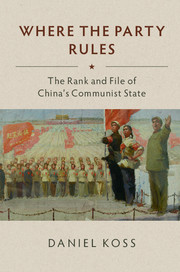Book contents
- Frontmatter
- Contents
- List of Figures
- List of Tables
- Acknowledgments
- PART I AUTOCRATIC GRASSROOTS POLITICS
- 1 Introduction: Party-Based Authoritarianism in China
- 2 A Theory of Authoritarian Regime Parties
- PART II THE PARTY IN CONTEMPORARY CHINA
- PART III THE PARTY'S ORIGINS
- PART IV THE PARTY IN THE MAO ERA
- Appendix 1 Party-versus-Bureaucracy Model
- Appendix 2 Party Growth Model
- Notes
- Primary Material
- Secondary Sources
- Index
1 - Introduction: Party-Based Authoritarianism in China
from PART I - AUTOCRATIC GRASSROOTS POLITICS
Published online by Cambridge University Press: 21 April 2018
- Frontmatter
- Contents
- List of Figures
- List of Tables
- Acknowledgments
- PART I AUTOCRATIC GRASSROOTS POLITICS
- 1 Introduction: Party-Based Authoritarianism in China
- 2 A Theory of Authoritarian Regime Parties
- PART II THE PARTY IN CONTEMPORARY CHINA
- PART III THE PARTY'S ORIGINS
- PART IV THE PARTY IN THE MAO ERA
- Appendix 1 Party-versus-Bureaucracy Model
- Appendix 2 Party Growth Model
- Notes
- Primary Material
- Secondary Sources
- Index
Summary
Political parties are pivotal institutions, in democratic and authoritarian contexts alike. Almost all seventy-one nondemocracies, in 2015 governing 44 percent of the world population, have parties. In most of these countries at least one party is tightly controlled by the ruling clique, such as United Russia, the United Malays National Organization, and Turkey's Justice and Development Party. In contrast to other autocratic arrangements, such as military dictatorship and personalistic rule, partybased authoritarianism has proven itself effective in governing modernizing societies and mitigating democratization pressures. But how do parties contribute to effective authoritarian rule? And what are the origins of effective regime parties? The first question calls for a study of contemporary autocratic governance. The second question takes us back to history. The literature provides answers to both questions, but incomplete ones. The case of the Chinese Communist Party (CCP), which is the focus of this book, promises to change the way we think about the functions and origins of effective authoritarian regime parties.
This book demonstrates that an authoritarian regime party can provide the organizational infrastructure that allows a state to project authority throughout its realm. By implication, the book explains why authoritarian regimes are usually more effective in some parts of their territories than in others: The uneven presence of rank-and-file party members makes an important difference for policy implementation on the ground. The CCP's rank and file empowers the state at the local level, precisely because the overwhelming majority of party members is not in bureaucratic positions, but works outside the government. Chapter 2 develops a new theory of authoritarian regime parties, after which the following two chapters test the theory's observable implications for subnational variation in contemporary state-building outcomes, and describe causal mechanisms. To do so, Chapter 3 analyzes the particularly challenging enforcement of the one-child policy, and Chapter 4 turns to the universally relevant statebuilding task of collecting taxes.
The next two chapters turn to the historical origins of local party strength, arguable found in the Second Sino-Japanese War (1939–1945). Chapter 5 shows that Japanese occupation shielded the Communists from persecution by the incumbent Nationalist government and allowed the party to recruit members behind enemy lines, shaping membership patterns at the time of the Communist takeover in 1949.
- Type
- Chapter
- Information
- Where the Party RulesThe Rank and File of China's Communist State, pp. 3 - 34Publisher: Cambridge University PressPrint publication year: 2018



